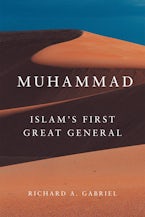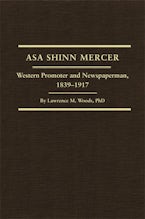Muhammad
Islam’s First Great General
Published by: University of Oklahoma Press
Imprint: University of Oklahoma Press
288 Pages | 6 x 9 | 12 maps
$29.95
Best known as the founder of a major religion, Muhammad was also Islam’s first great general. While there have been numerous accounts of Muhammad the Prophet, this is the first military biography of the man.
In Muhammad: Islam’s First Great General, Richard A. Gabriel shows us a warrior never before seen in antiquity—a leader of an all-new religious movement who in a single decade fought eight major battles, led eighteen raids, and planned thirty-eight other military operations. Gabriel’s study portrays Muhammad as a revolutionary who introduced military innovations that transformed armies and warfare throughout the Arab world.
Gabriel analyzes the environment in which Muhammad lived and the religion he inspired as they relate to his military achievements. Gabriel explains how Muhammad changed the social composition of Arab armies by replacing traditional ways of fighting with a new command structure.
Muhammad’s transformation of Arab warfare enabled his successors to establish the core of the Islamic empire—an accomplishment that, Gabriel argues, would have been militarily impossible without Muhammad’s innovations. Richard A. Gabriel challenges existing scholarship on Muhammad’s place in history and offers a viewpoint not previously attempted.
Richard A. Gabriel, a historian, is Adjunct Professor of Humanities and Ethics at Daniel Webster College. He is the author of forty books, including The Great Battles of Antiquity, The Great Armies of Antiquity, and Great Captains of Antiquity.
“Gabriel brilliantly succeeds in detailing the military life of the Prophet Muhammad while expertly discussing the substantial interconnection of war, politics, and religion. He makes a convincing argument that it was not simply Muhammad’s military accomplishments but his fundamental transformation of military and cultural life that allowed his successors to triumph over Persia and Byzantium and further Islam.”—Foreword












